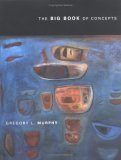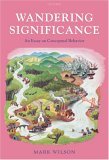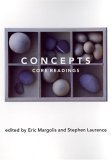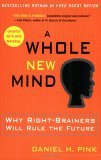June 10, 2007
Via Mind Hacks, Brad Pasanek’s “Mind is a metaphor” website has a blog and a database of metaphors from British 18th-century literature. Pasanek’s site has a link to the Open University’s Metaphor Analysis Project, which has collected some papers on contemporary theories of metaphor, starting with Lakoff & Johnson.
Comments (0)
- cognitive science,mind
June 9, 2007
 Concepts: Where Cognitive Science Went Wrong (Oxford Cognitive Science Series)
Concepts: Where Cognitive Science Went Wrong (Oxford Cognitive Science Series) by Jerry Fodor (1998)
by Jerry Fodor (1998)
 The Big Book of Concepts (Bradford Books)
The Big Book of Concepts (Bradford Books) by Gregory L. Murphy (2002/2004) – Opening line: “Concepts are the glue that holds our mental world together.”
by Gregory L. Murphy (2002/2004) – Opening line: “Concepts are the glue that holds our mental world together.”
 Wandering Significance: An Essay on Conceptual Behaviour
Wandering Significance: An Essay on Conceptual Behaviour by Mark Wilson (2006)
by Mark Wilson (2006)
 Concepts: Core Readings
Concepts: Core Readings edited by Eric Margolis and Stephen Laurence (1999)
edited by Eric Margolis and Stephen Laurence (1999)
“Concepts” at Stanford Encyclopedia of Philosophy
“Concept” at Wikipedia
“The classical theory of concepts” at Internet Encyclopedia of Philosophy
Online papers on concepts, compiled by David Chalmers (part of “Online papers on consciousness”)
Comments (1)
- cognitive science
June 7, 2007
 In A Whole New Mind: Why Right-Brainers Will Rule the Future
In A Whole New Mind: Why Right-Brainers Will Rule the Future , author Daniel H. Pink maintains that forces of “Asia, automation, and abundance” are leading to a change from the Information Age to what he terms the “Conceptual Age,” which calls for the development of “right-brained” abilities:
, author Daniel H. Pink maintains that forces of “Asia, automation, and abundance” are leading to a change from the Information Age to what he terms the “Conceptual Age,” which calls for the development of “right-brained” abilities:
Design – not just function
Story – not just argument
Symphony – not just focus
Empathy – not just logic
Play – not just seriousness
Pink includes suggestions and resources for developing each of the six skills, and I’ve enjoyed exploring many of them. Some of the books he recommends –
Story: Substance, Structure, Style and The Principles of Screenwriting ,
,
Beethoven’s Anvil: Music in Mind and Culture ,
,
How to See: A Guide to Reading Our Man-Made Environment ,
,
The Muse Learns to Write: Reflections on Orality and Literacy from Antiquity to the Present , and
, and
What Video Games Have to Teach Us About Learning and Literacy ….
….
Link to Dan Pink’s blog.
Howard Gardner recently published a book with a similar theme: Five Minds for the Future – his “five minds” are disciplined, synthesizing, creating, respectful and ethical.
– his “five minds” are disciplined, synthesizing, creating, respectful and ethical.
Comments (1)
- mind
June 3, 2007
In I Am a Strange Loop , Douglas Hofstadter doesn’t use the term tangled hierarchy but possibly it was in Gödel, Escher, Bach: An Eternal Golden Braid
, Douglas Hofstadter doesn’t use the term tangled hierarchy but possibly it was in Gödel, Escher, Bach: An Eternal Golden Braid – at least Wikipedia associates the two terms by making tangled hierarchy refer to strange loop.
– at least Wikipedia associates the two terms by making tangled hierarchy refer to strange loop.
I had written down this quote a few years ago from Amit Goswami, The Self-Aware Universe :
:
The self of our self-reference is due to a tangled hierarchy, but our consciousness is the consciousness of the Being that is beyond the subject-object split. There is no other source of consciousness in the universe. The self of self-reference and the consciousness of the original consciousness, together, make what we call self-consciousness. (p. 188)
So Goswami, unlike Hofstadter, distinguishes between consciousness and the self.
Comments (0)
- consciousness,self
 Concepts: Where Cognitive Science Went Wrong (Oxford Cognitive Science Series)
Concepts: Where Cognitive Science Went Wrong (Oxford Cognitive Science Series)
 Wandering Significance: An Essay on Conceptual Behaviour
Wandering Significance: An Essay on Conceptual Behaviour Concepts: Core Readings
Concepts: Core Readings In
In 

